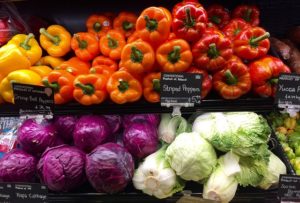Not long ago, during a weekly grocery shopping trip, I had a weird thing happen. At the end of the trip in the checkout line, the cashier tossed my groceries toward me as I bagged. Sack of onions; scan, toss, plop. Head of lettuce; scan, toss, plop. Bag of slivered almonds; scan, toss, plop. And so on for every item in my cart.
It totally pissed me off, but I didn’t say anything. I kept it to myself partly because I didn’t quite know what to say and partly because I wasn’t sure  why I was so pissed off. It took me a few minutes, but driving away from the store, it came to me. Before shopping for groceries, I had made a list and thought through the meals I would be making. I shopped with intention, choosing mostly organic foods when it made sense, thinking through the protein in each meal and trying to pick foods that were healthy. So getting to the checkout line and having the cashier just throw my food felt disrespectful to the whole process. But my irritation went even further than that.
why I was so pissed off. It took me a few minutes, but driving away from the store, it came to me. Before shopping for groceries, I had made a list and thought through the meals I would be making. I shopped with intention, choosing mostly organic foods when it made sense, thinking through the protein in each meal and trying to pick foods that were healthy. So getting to the checkout line and having the cashier just throw my food felt disrespectful to the whole process. But my irritation went even further than that.
We are all different in our attitudes on what and how we eat. For me, Chinese medicine plays a role in what I eat and how I cook the foods I buy. That’s because I know that foods have inherent properties and actions on your body, and even how they’re cooked can affect you. In Chinese nutritional theory, foods can be chosen to boost your energy, nourish your blood, drain excess moisture or combat dryness, support your immunity, tamp down inflammation and strengthen your digestion.
Foods can also warm you up or cool you down. This isn’t about spiciness or how hot it’s served, but more about the overall effect on your body, digestion and metabolism. For example, a meal of vegetables made with ginger, onions and squash is considered to be warming, while a bowl of yogurt with berries and granola is cooling—and sometimes one is a better choice for your specific needs than the other. In addition, the longer you cook your food, the more warming it is. For that reason, roasted vegetables are far more warming than a salad. If you’re exhausted or physically depleted, it’s good to know that eating warm foods support your energy in the form of digestive fire, while cool foods can lower the temp on inflammation, flushing and other hot conditions. And speaking of energy, what you eat gives you the energy to do everything you do, including getting out of bed in the morning, fighting off the flu and even digesting your food to create more energy. So yeah, I shop with intention, keeping all that in mind.
The other thing about your groceries is that what you eat comes from the earth, for the most part. Whether you’re eating grains, fruits, vegetables, meat, dairy, or fish or drinking a cup of coffee or tea, it all begins with the earth. The only exception to this may be the chemicals and dyes that are added to your food to enhance flavor, texture or freshness. My point is that your food is planted, harvested, handled and gets to you through the hard work of others—those who picked, packed, transported and put it on the shelves. The food you eat is a huge project in which millions of people participate.
added to your food to enhance flavor, texture or freshness. My point is that your food is planted, harvested, handled and gets to you through the hard work of others—those who picked, packed, transported and put it on the shelves. The food you eat is a huge project in which millions of people participate.
So back to the cashier tossing my groceries. Maybe the result on that day was a bruise on a banana or a pepper—not a big deal. However, the affront felt bigger than that. It was disrespectful of the entire process, a lack of awareness of where our food comes from, disregard for the people who work to bring food to you, an indifference to the intentionality of putting food on the table, and for Pete’s sake, I was bagging the groceries for her!



